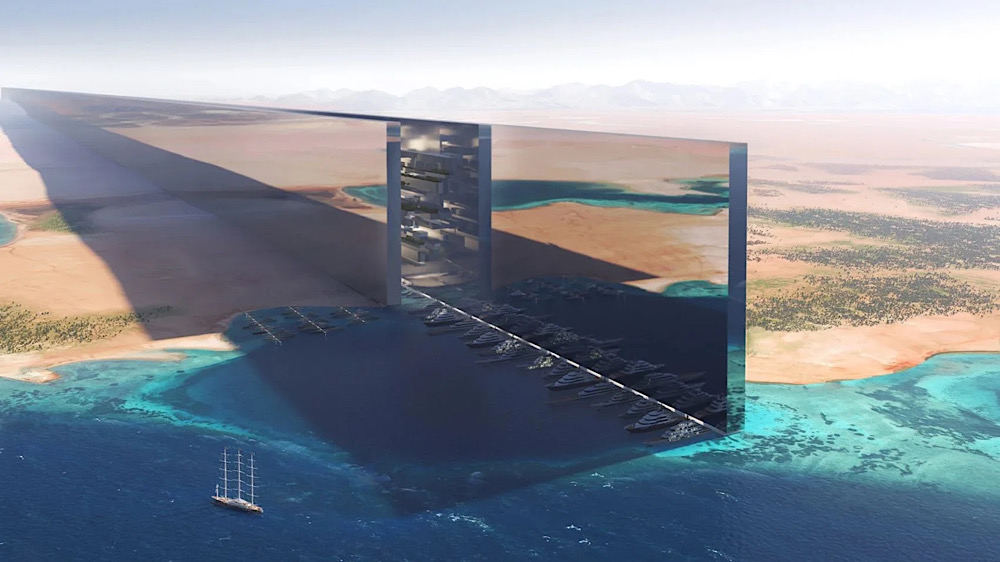Riyadh 'scales back' ambitions on Neom, first redundancies among workers
'The Line' was supposed to accommodate 1.5 million people by 2030, but updated plans speak of less than 300,000 by then. Out of 170 km of the total development, only 2.4 km will be realised by 2030. At least one contractor has already started cutting staff and the Saudi Public Investment Fund is looking for liquidity.
Riyadh (AsiaNews) - First cracks in the development and investment objectives of Mohammed bin Salman (Mbs): Riyadh is in fact reducing its medium-term ambitions for the Neom desert, the main project within the crown prince's plans to diversify the economy from dependence on oil.
By 2030, in fact, the Saudi government hoped to have 1.5 million residents in The Line, the beating heart of the futuristic city; in reality, as emerges from a report published by Bloomberg, officials predict that fewer than 300 thousand inhabitants will be welcomed by that date.
Neom is the futuristic city desired by Mbs, within the framework of the economic reforms promoted as part of the "Vision 2030", a modernization plan in open competition with the other metropolises of the Gulf.
The city has been built from scratch in the desert overlooking the Red Sea, where everything must be eco-sustainable and reachable on foot in five minutes, but with the possibility of moving from one end to the other in 20 minutes on a high-speed train. Plans include an industrial city, ports and tourism infrastructure, as well as hosting the 2029 Asian Winter Games in a mountain resort called Trojena.
The development of the "Line" should take place in several phases and, ultimately, cover a stretch of coast approximately 170 km long; the first was supposed to end in 2026 and reach between 1.5 and 2 million inhabitants in 2030, reaching nine million in 2045.
Based on the latest updates, however, it emerges that only 2.4 km should be completed by 2030 and, for this reason, at least one contractor has started to lay off some of the construction site workers. Representatives of Neom and the Kingdom's Public Investment Fund declined to comment on the news, but the first signs of trouble seem evident.
The downsizing comes at a standstill, with the Saudi sovereign wealth fund still having to approve Neom's 2024 budget. This shows that the financial reality of trillions of dollars of investments is starting to worry the highest levels of government about its actual sustainability and effectiveness.
Industry officials have already announced that some of the projects will be delayed beyond 2030. A longer period is needed to "build sufficient factories and human resources," Finance Minister Mohammed Al Jadaan said in December. “The delay,” he added, “or rather the [time] extension of some projects will serve the economy.”
Meanwhile, the Public Investment Fund is evaluating a series of options to raise liquidity, including the acceleration of the sale of debt and an offering of shares of portfolio companies.
The sovereign wealth fund's cash reserves fell to billion in September, the lowest level since 2020. In 2022, the crown prince said Neom's first phase is expected to cost 1,200 billion riyals (0 billion) by 2030. Half of this figure should come from the PIF, in the hands of the "de facto ruler" bin Salman.
In trying to wean the country away from overreliance on oil with his Vision 2030 plan, Crown Prince Mohammed bin Salman has started to reshape the country’s social life and hardline interpretation of Islam.
The first reforms introduced in 2019 have touched social relations and individual rights, such as granting women the right to drive and (separate) access to stadiums.
The crown prince also boosted the local entertainment industry and promoted new technologies. In religious matters, he initiated a progressive move away from Wahhabism.
At the same time, the arrests of senior officials and business leaders, the crackdown on activists and critical voices, and the Khashoggi affair have cast a long a shadow on how real change is in the kingdom, which seems to be driven more by economic imperatives than a desire for greater openness.
12/02/2016 15:14
07/02/2019 17:28







.png)










